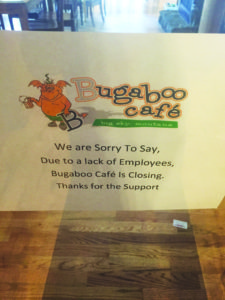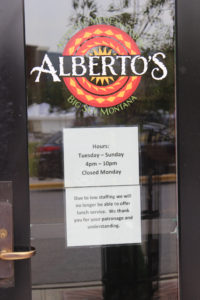Local café closes doors, other businesses cut hours due to lack of employees
By Sarah Gianelli EBS Contributor
BIG SKY – After 12 years of business, Bugaboo Café’s open sign was replaced in late July with a stark closure notice citing a shortage of workers.
Were this an isolated incident, it might be easy to blame poor management, but other local eateries—Alberto’s Mexican Cuisine, Blue Moon Bakery and Chopper’s Grub and Pub, among others—have curtailed their hours of operation claiming the same issue.

Geoff Calef bought Bugaboo Café last July and never thought his business would fail because of an employee shortage. Most businesses fail due to a lack of clientele, Calef said.
In February, Calef cut Bugaboo’s hours from six days a week to four. By May, he was down to three employees total working the full-service breakfast and lunch spot, and logging 11-hour days himself in an attempt to keep the business afloat.
“I had the business just not the employees,” Calef said. “I had to turn people away people multiple times. One person can only do so much.”
Calef first looked at where he might have failed as a business owner, but knows he was not alone in his struggle to find employees and didn’t think it was because he wasn’t paying enough. He said his servers earned an hourly rate slightly above Montana’s $8.05 minimum wage, augmented by tips, and line cooks made up to $16 per hour.
“Why commute to Big Sky when you can get the same job in Bozeman?”
“What it boils down to is housing,” Calef said. “I had a great employee from Belgrade but he got tired of the drive. Why commute to Big Sky when you can get the same job in Bozeman? If people had places to live up here, or if there was more decent housing available, it wouldn’t be an issue. Developers seem to be building more and more storefronts and less and less housing to go with it.”
In Calef’s ideal world, Bugaboo would be open seven days a week with enough employees to sustain those hours. But he doesn’t see a resolution anytime soon to the interrelated problems of ample staffing and affordable workforce housing.
In Big Sky Town Center, Brenda Godoy, co-owner of Alberto’s Mexican restaurant, expressed similar staffing challenges during one of the busiest summers she’s seen in 10 years in Big Sky.

Even working 14-16 hour days, six days a week alongside her husband, Alberto, and employing their teenage children and other high schoolers, the restaurant was unable to keep up with lunch crowds. Exhausted after an especially busy Big Sky PBR weekend, the Godoys closed the restaurant for four days, concluding that the only option was to stop lunch service and focus solely on dinner.
Brenda Godoy echoed Calef’s sentiment that housing is the main issue.
“I know because that’s what everyone asks me for,” she said. “Instead of being asked how much I pay, [potential employees] ask if I provide housing.”
Last January, the Godoys housed three kitchen staff in their own home, a three-bedroom condo already sheltering their family of four. Now, despite the added financial burden, they rent an additional condo to accommodate a small number of employees as added incentive to work at their restaurant. Reluctantly, Godoy is looking into contracting J-1 visa workers from outside the country. These young employees commit to one business for a set amount of time. The conundrum is that the employer must provide housing.
“I don’t want to do that but it’s that desperate,” Brenda said. “I have to find a way to make it work if I want to be here. I just need bodies. If I knew a better solution I would’ve tried it already.”
On the other end of the spectrum, some restaurants such as Lotus Pad are expanding. With the help of recently acquired business partners and investors, the busy Thai restaurant is moving into a new, much larger space currently under construction on Town Center Avenue with plans to open in December.
Lotus Pad owner Alex Hoeksema is not immune to the employee shortage in Big Sky. Two winters ago, three employees quit simultaneously and left Big Sky because they couldn’t find housing. One of them was living in his car until it got too cold. Last summer, Hoeksema dropped her operating hours down to six days a week because she was short staffed.

She knows that doubling her staff for the new location will be double the challenge, but Hoeksema is unflaggingly optimistic. She attributes her relative ease in attracting and retaining employees to her management style.
“We get people from other businesses that aren’t paying competitive wages,” Hoeksema said. “That’s why I think we’re able to stay staffed. As a business owner, you do what you have to. At the end of the day it’s more profitable to pay people more than it is to close a day a week.”
Hoeksema also strives to engender a positive work culture. Last year she bought ski passes for her committed employees, and after two years of employment Hoeksema sends her chefs on a paid trip to Thailand. She says her employees receive steep discounts at the restaurant, seasonal raises and other occasional perks.
“Still, we definitely need lower income housing,” Hoeksema said. “And there are people in the community really working on that right now. It’s a tricky subject and it’s really affecting the small businesses—none of us have the capital to buy condos to house employees.”
Local investor Loren Bough provided an initial land donation of 10 acres in the South Fork neighborhood currently slated for 32 multi-family units and five single-family home lots. Employees in the public service sector including teachers, law enforcement, nurses and nonprofit workers will have priority, but the housing development will be open to the whole community, Bough said.
“The Bough parcel is full-steam ahead,” he reported in an Aug. 17 email. “HRDC and [Lone Mountain Land Company] are thinking that the move-in date will be one year from now.”
Construction costs are the biggest obstacles, according to Scott Altman, a local developer and real estate agent. For two years, Altman has been developing plans to build workforce-housing units called Big Sky Lofts, east of the new Ace Hardware building.
The development, if approved by Gallatin County Commissioners, will be located on a 16-acre plot of land presently called the Sweetgrass Hills Subdivision, and take up about eight acres. Altman has said that local employers have inquired about approximately half of the project’s estimated 46 units.
But a firm timeline for the project has yet to be established, according to Gallatin County Planner Tim Skop.
Skop and Altman disagree on how long the project might take to begin construction, but Altman said he hopes to have the development housing local workers by winter 2017.
“We want to be substantially under market value for the development,” Altman said, “and to make sure local businesses have first crack at this.”
In the interim, the Brenda and Alberto Godoy will fly in family members from Mexico during peak times of the summer and winter seasons to alleviate the pressure of inadequate staffing.
And Calef, while trying to sell his business, will open for breakfast counter service Thursday through Sunday from 7:30-11:30 a.m., beginning Aug. 18.
Calef will cook and serve a scaled-back version of Bugaboo’s standard menu with a dishwasher as his only other employee.











